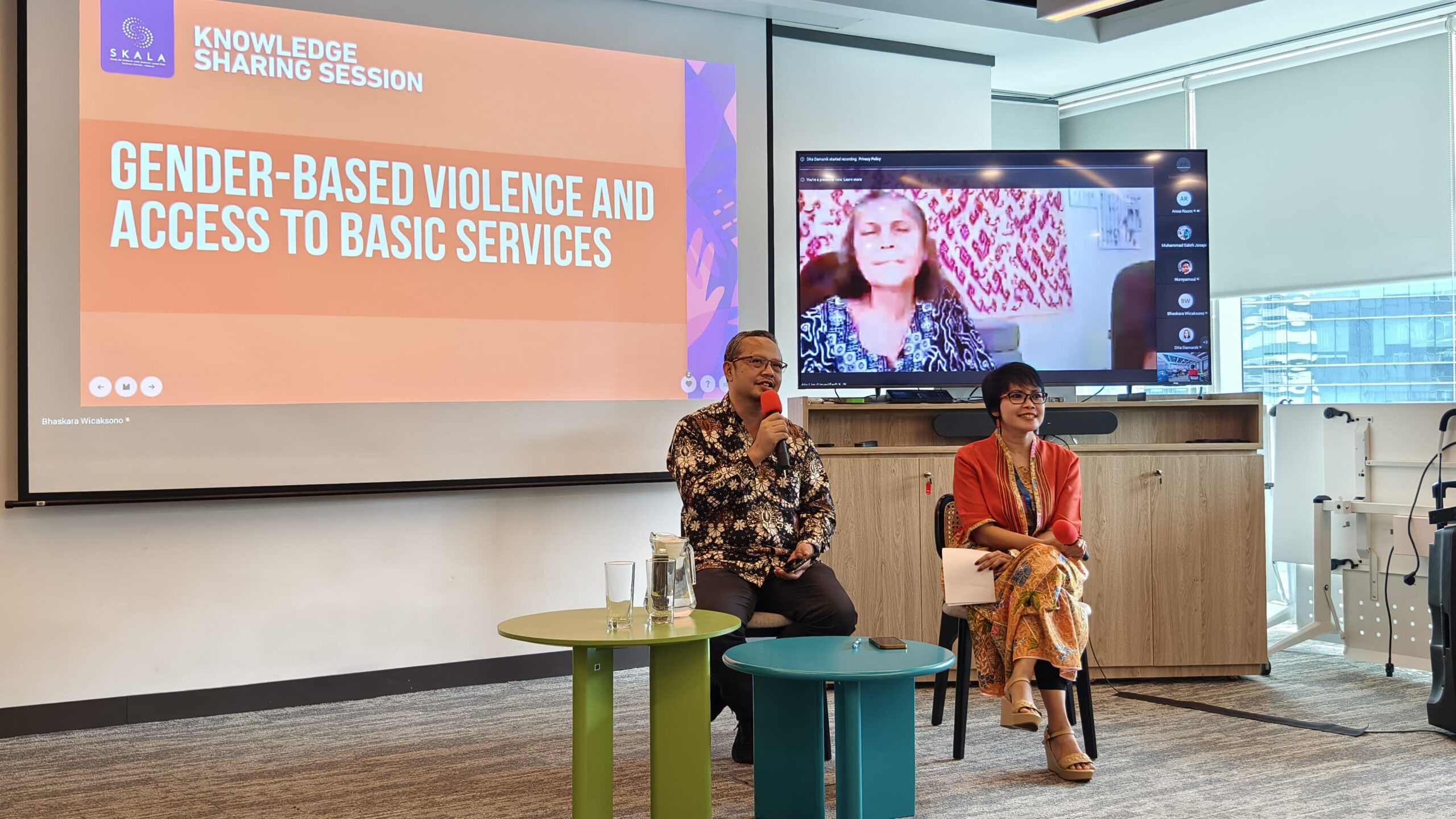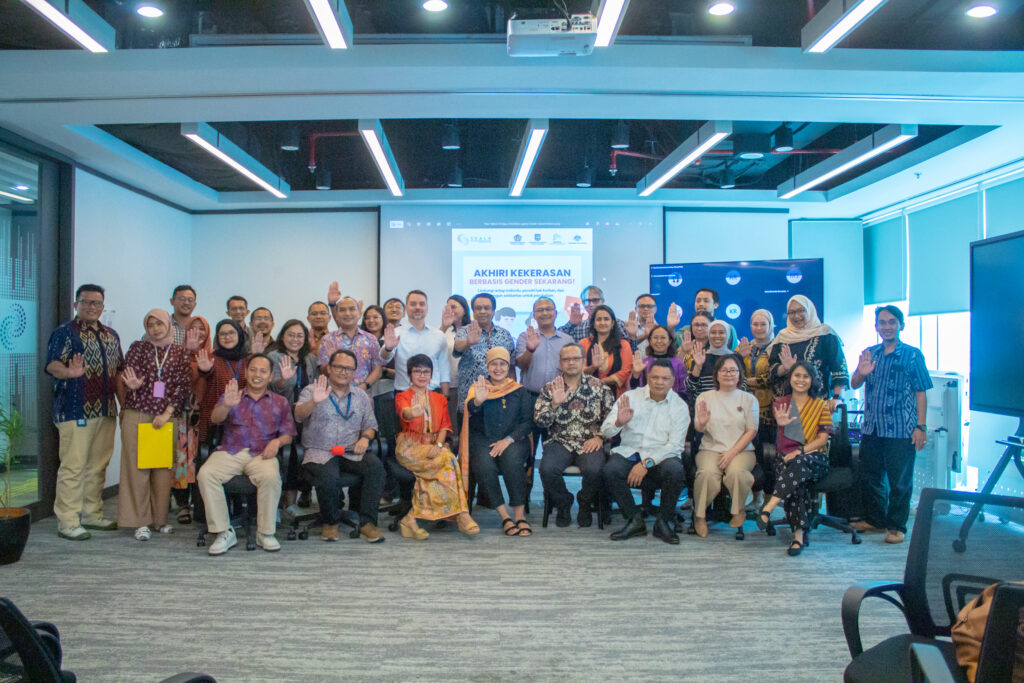Combating Gender-Based Violence through Quality Basic Services: Policies and Practices

The 2024 Women’s Life Experience Survey reports that one in four women in Indonesia has experienced physical or sexual violence in their lifetime. While this is lower than the global statistic—one in three women—it still reflects a significant challenge related to gender-based violence. With the 2030 Sustainable Development Goals (SDGs) deadline approaching, the 16 Days of Activism Against Gender-Based Violence campaign, themed “Unite to End Violence Against Women,” is a strong call for collective action.
According to a report by Equal Measures 2030, progress towards gender equality has stalled in 40% of countries. Indonesia ranks 66th out of 139 countries, with a score of 67.9. While progress has been made, this score indicates that much work remains to be done to achieve gender equality.
As part of the 16 Days of Activism Against Gender-Based Violence campaign, SKALA hosted a Knowledge Sharing Session on “Gender-Based Violence (GBV) and Access to Basic Services” on November 26, 2024. The event featured founder of Yayasan Bumi Sehat Robin Lim, and Expert Staff to the Minister of Women’s Empowerment and Child Protection in Legal and Human Rights Affairs Indra Gunawan, who shared insights and lessons on addressing GBV. Moderated by SKALA GEDSI Lead, Lisa Noor Humaidah, the interactive session brought together participants from the Australian Embassy, government partners, DT Global, and the SKALA team to foster productive dialogue.
Translating Policies into Action to Protect Survivors
Indonesia has taken a significant step to address GBV through Law No. 12 of 2022 on the Crime of Sexual Violence (Undang-Undang Tindak Pidana Kekerasan Seksual/UU TPKS), which provides a legal framework for the prevention, treatment, protection and recovery from sexual violence. The law ensures survivors’ access to medical rehabilitation, social support, restitution and compensation. Presidential Decree No. 55 of 2024 strengthens this policy by directing local governments to establish service units that provide one-stop services so it is easier for survivors to access assistance. While all provinces have established these units, 200 out of 514 cities/districts still lack them.
“Since the UU TPKS was passed, the government has established service units to address violence against women and children. The government also has a special allocation fund through the Ministry of Finance to support the operations of these service units,” Indra said.
Community empowerment efforts are also crucial in addressing GBV. Through the Friendly Village for Women and Children program, the government aims to raise awareness about violence against women and children, while also creating a safe space for women to share their stories and seek help.
Indra acknowledged that there is still room for improvement in ensuring that survivors of GBV receive the necessary services. For example, survivors of sexual violence are currently unable to use their national health insurance (BPJS) to cover the costs of medical or psychological counselling services. Support for survivors is currently managed by the Witness and Victim Protection Agency (Lembaga Perlindungan Saksi dan Korban/LPSK), but the scope of its services remains limited. Therefore, it is crucial to advocate for BPJS to cover the costs of services for survivors in the future.
Building a Quality Maternal Health Service Model
One of the SDG targets is to reduce the global maternal mortality ratio (MMR) to 70 deaths per 100,000 live births by 2030. In Indonesia, the MMR remains high, with 305 deaths per 100,000 live births in 2022, far from the national target of 183 by 2024. One solution to achieving this target is integrating GBV prevention into maternal health services.
This approach has been implemented by Robin Lim through the Yayasan Bumi Sehat, a maternal health clinic that was originally established in Bali. This clinic provides holistic services for women during pregnancy, childbirth, and postpartum. Fathers are involved in the childbirth and parenting processes.
“A father’s involvement in reproductive health is crucial to preventing gender-based violence,” said Robin.
She emphasised the importance of open communication and mutual respect in the interactions between midwives, doctors, pregnant women, and expectant fathers. Healthcare providers need to provide honest and transparent information to women so that they can make informed decisions about their birth plans, including their preferred birthing position. Involving husbands and family members in the process not only strengthens the support system, but also creates an environment in which women feel safe and comfortable.
Yayasan Bumi Sehat also provides mobile services in disaster-affected areas and villages in Papua and Aceh. Doctors and midwives use motorcycles to deliver services directly to women, including early detection of cervical and breast cancer to bring health services to the most remote communities.
Momentum for Unified Action
This 1.5-hour session discussed policies and practices to address GBV and improve access to basic services. SKALA Team Leader Petrarca Karetji highlighted the urgency of the 16 Days of Activism campaign.
“This campaign is not just a reminder but a call to action. Through activities like this, we also gain a better understanding of the challenges and experiences of the community, which can inform SKALA’s work with the Government of Indonesia,” he said.
Speakers agreed on the importance of collaboration between government, the private sector, civil society and academia to tackle GBV. The gender-responsive approach to basic services, as implemented by Yayasan Bumi Sehat, is also equally important to deliver inclusive services. As the saying goes, “it takes a village to raise a child”, so it takes collective action to end Gender-Based Violence.







